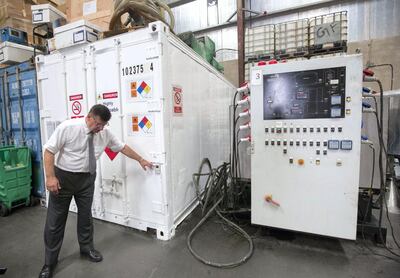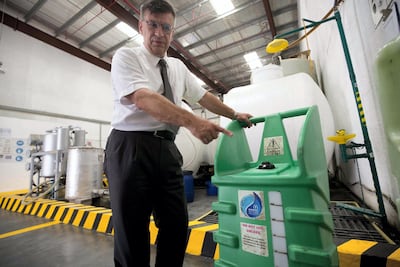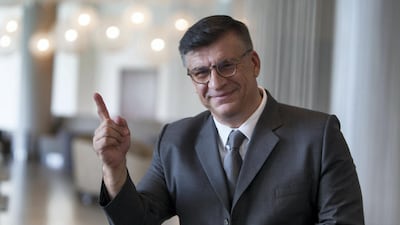In a small factory in Dubai Investment Park, where the doors are kept open 24/7 to avoid trapping fumes, a small team of engineers carefully oversees the production of the UAE’s indigenously-made biofuel.
Plastic modules filled with a thick viscous liquid, some filled to the brim with biofuel ready for distribution, others with cooking oil waiting to be catalysed are carefully arranged in the factory.
It’s nearly 45 degrees outside, but there’s only a small fan to keep things cool.
“The enzymes should not be allowed to cool,” Karl Feilder, chief executive and founder of Neutral Fuels explains why his factory floor is not climate controlled.
Mr Feilder is behind the UAE’s first homegrown initiative to turn waste cooking oil into biofuel, on which the entirety of the country’s fleet of McDonald’s vehicles runs.
Entirely self-funded, the company was grown when Mr Feilder, who has already sold five companies and taken two public was being consulted by the Dubai Economic Department in 2009 to look at ways to lower the carbon footprint of the emirate’s logistics sector.
Mr Feilder was also pressed to look into some of sort alternative fuel strategy for the transportation sector as part of his study. He went back to the department a year later saying biofuel was “the easiest” and "most readily acceptable alternative” particularly if manufactured from waste oil already available in the UAE.
When asked how that could be possibly done, he said he was going to build it himself.
With some background in understanding how biofuel was made in Europe, Mr Feilder fine-tuned the technology to work in the Middle East.
With McDonald’s as a partner, Mr Feilder brought on the fast food chain’s supply chain partners such as Del Monte to run on biofuel as well, eventually clocking up five million kilometres within five years of being in business.

“The McDonald’s fleet is a 100 per cent biofuel so there’s no fossil fuel at all and many people will tell you today is that it’s not possible and one of the reasons we did it is to show people it’s not impossible at all,” he says.
Nearly a decade after he started, the fleet today has completed 13 million km on his biofuel, with Neutral Fuels growing its revenues 1000 per cent over the last five years.
By the end of the year, Neutral Fuels would’ve branched out to India as well as Bahrain, with two more locations to be added in the UAE.
"The first one we’re opening in India. We’re building one in Delhi at the moment, the factory has been commissioned in July/August,” says Mr Feilder.
"Our main plant is in Dubai, and we’re building a second one in Ras Al Khaimah and a third one in one of the emirates, so we’ve got two programmes going and we’re not sure, which one is going to happen first,” he says.
The company has also successfully launched a bond on the Frankfurt Stock Exchange raising "a substantial quantity of money”, says Mr Feilder, without disclosing the amount, as the instrument is subject to strict regulation.
However, he says there was healthy investor appetite globally to invest in a sector, and in a region that was rather interesting.
Mr Feilder plans to take the company public in 2024, with London targeted for an initial public offering.
"I’ve done that twice before so I know the process,” he explains.
"We’ve had to change our auditors, restructuring the way that the business is set up so we can do that but also expanding quickly into other markets,” he adds.

Like other startups in the UAE, Neutral Fuels also tried crowdfunding as an option five years since it started but realised quickly that it was not a suitable financial model.
One, reflects Mr Feilder, was the fact that most start-ups in the emirates seeking crowdfunding were app-based and therefore relatively “low cost” and two, they were, generally not profitable.
"Nobody really understood what biofuels were in the Middle East, so it didn’t work and that was fine. We learned something from it, gave us an interesting case study to talk to students and share our knowledge with,” he says.
Having taken a decision nearly 13 years ago “collectively as a family” to only engage in business that saves the planet, Mr Feilder through his commitment to the cause realised that smaller production of the fuel was more sustainable and offered higher yield.
"A really big factory in Europe would be doing 10 million litres per month of production. At the moment we can do about half a million,” he says.
"Our average is between 93 and 94 per cent yield. So for a 1000 litres of biodiesel we need 930 litres of cooking oil. In Europe they’re averaging around 70 per cent yield,” he adds.
The difference being large-scale production of biofuel relies on aggregators, sourcing feedstock from multiple sources, which could be animal waste, ground-up chicken or even chicken feathers as long as the material contains oil. The off takers for such large-scale production in Europe are the oil majors who then blend it in a refinery and distribute it themselves.
Neutral Fuels on the other hand relies on direct sourcing from restaurants and hotels, with distribution made directly back to those sources.
“So there are no intermediaries on either side of our supply chain, so this means we can be more sustainable long-term, we can make a profit and we can continue to replicate this model,” says Mr Feilder.
Having taken up the challenge a decade ago, Mr Feilder is confident that production of biofuel does not have to take up acres of arable land or expensive feedstock. It can be done simply with material sourced in kitchens.
“Our own strategy says that we can build 50 of these facilities, around the region. Any city that has more than a million people will have sufficient supply of waste and sufficient off take of the biofuel,” he says.


